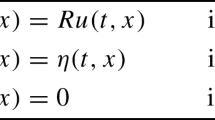Abstract
An optimal control problem for the advection-diffusion equation is studied using a Lagrangian-moving mesh finite element method. The weak formulation of the model advection–diffusion equation is based on Lagrangian coordinates, and semi–discrete (in space) error estimates are derived under minimal regularity assumptions. In addition, using these estimates and Brezzi-Rappaz-Raviart theory, symmetric error estimates for the optimality system are derived. The results also apply for advection dominated problems
Similar content being viewed by others
References
F. Abergel R. Temam (1990) ArticleTitleOn some control problems in fluid mechanics Theor. Comput. Fluid Dyn 1 303–326 Occurrence Handle10.1007/BF00271794
R. E. Bank R. F. Santos (1993) ArticleTitleAnalysis of some moving space-time finite element methods SIAM J. Numer. Anal. 30 1–18 Occurrence Handle93m:65141
K. Chrysafinos L. S. Hou (2002) ArticleTitleError estimates for semidiscrete finite element approximations of linear and semilinear parabolic equations under minimal regularity assumptions SIAM J. Numer. Anal. 40 282–306 Occurrence Handle10.1137/S0036142900377991 Occurrence Handle2003e:65175
Chrysafinos K., Walkington N.J. (in preparation). Lagrangian and moving mesh methods for the convection diffusion equation
Ciarlet P.G. (2002). The finite element method for elliptic problems. SIAM Classics Appl. Math.
T. F. Dupont (1982) ArticleTitleMesh modification for evolution equations Math. Comp. 39 85–107 Occurrence Handle0493.65044 Occurrence Handle84g:65131
T. F. Dupont Y. Liu (2002) ArticleTitleSymmetric error estimates for moving mesh Galerkin methods for advection-diffusion equations SIAM J. Numer. Anal. 40 914–927 Occurrence Handle10.1137/S0036142900380431 Occurrence Handle2004b:65147
Fursikov A. (2000). Optimal control of distributed systems. Theory and Applications, AMS, Providence
V. Girault P. -A. Raviart (1986) Finite Element Methods for the Navier-Stokes Equations Springer-Verlag New York
Gunzburger M. D. (2003). Perspectives in flow control and optimization, SIAM, Advances in Design and Control, Philadelphia
M.D. Gunzburger L.S. Hou T. Svobodny (1991) ArticleTitleAnalysis and finite element approximation of optimal control problems for the stationary Navier-Stokes equations with Dirichlet controls RAIRO Modél. Math. Anal. Numér 25 711–748 Occurrence Handle92k:49061
M.D. Gunzburger S. Manservisi (2000) ArticleTitleThe velocity tracking problem for Navier-Stokes flows with bounded distributed control SIAM J.Cont. Optim. 37 1913–1945 Occurrence Handle2000i:35158
M. D. Gunzburger S. Manservisi (2000) ArticleTitleAnalysis and approximation of the velocity tracking problem for Navier-Stokes flows with distributed control SIAM J. Numer. Anal. 37 1481–1512 Occurrence Handle2001h:76047
K. H. Masahiro Hayashi M. Kawahara (1991) ArticleTitleLagrangian finite element method for free surface Navier-Stokes flow using fractional step methods Int. J. Numer. Methods fluids 13 841–855
L. S. Hou (2001) ArticleTitleError estimates for semidiscrete finite element approximation of the Stokes equations under minimal regularity assumptions J. Sci. Comput. 16 287–317 Occurrence Handle10.1023/A:1012869611793 Occurrence Handle0996.76048 Occurrence Handle2002i:65103
G. Knowles (1982) ArticleTitleFinite element approximation of parabolic time optimal control problems SIAM J.Cont. Optim 20 414–427 Occurrence Handle0481.49026 Occurrence Handle84h:49059
I. Lasiecka (1984) ArticleTitleRietz-Galerkin approximation of the time optimal boundary control problem for parabolic systems with Dirichlet boundary conditions SIAM J. Cont. Optim. 22 744–500 Occurrence Handle85m:49061
I. Lasiecka R. Triggiani (2000) Control Theory for Partial Differential Equations Cambridge University press Cambridge
W. -B. Liu N. Yan (2003) ArticleTitleA posteriori error estimates for optimal control problems governed by parabolic equations Numer. Math. 93 497–521 Occurrence Handle10.1007/s002110100380 Occurrence Handle2003k:49067
Y. Liu R.E. Bank T.F. Dupont S. Garcia R.F. Santos (2003) ArticleTitleSymmetric error estimates for moving mesh mixed methods for advection-diffusion equations SIAM J. Numer. Anal. 40 2270–2291 Occurrence Handle10.1137/S003614290038073X Occurrence Handle2004f:65141
R. Li W. -B. Liu H. -P. Ma T. Tang (2002) ArticleTitleAdaptive finite element approximation for distributed elliptic optimal control problems SIAM J. Control. Optim. 41 1321–1349 Occurrence Handle2004a:49036
R. Li T. Tang P. -W. Zhang (2001) ArticleTitleMoving mesh methods in multiple dimensions based on harmonic maps J. Comput. Phys. 170 562–588 Occurrence Handle10.1006/jcph.2001.6749 Occurrence Handle2002e:65139
R. Li T. -W. Tang P. Zhang (2002) ArticleTitleA moving mesh finite element algorithm for singular problems in two and three space dimensions J. Comput. Phys. 177 365–393 Occurrence Handle10.1006/jcph.2002.7002 Occurrence Handle2003c:65093
W. -B. Liu N. Yan (2003) ArticleTitleA posteriori error estimates for optimal control problems governed by parabolic equations Numer. Math. 93 497–521 Occurrence Handle10.1007/s002110100380 Occurrence Handle2003k:49067
I. Malcevic O. Ghattas (2002) ArticleTitleDynamic-mesh finite element method for Lagrangian computational fluid dynamics Finite elem. Anal. Design 38 965–982 Occurrence Handle1906245
Neittaanmaki P., Tiba D. (1994). Optimal control of nonlinear parabolic systems. Theory Algorithms and Applications M. Dekker, New York
R. Temam (1979) Navier-Stokes Equations North Holland Amsterdam
F. Troltzsch (1993) ArticleTitleSemidiscrete Ritz-Galerkin approximation of nonlinear parabolic boundary control problems Int. Series Numerical Math 111 57–68 Occurrence Handle95f:49046
F. Troltzsch (1994) ArticleTitleSemidiscrete Ritz-Galerkin approximation of nonlinear parabolic boundary control problems- Strong convergence of optimal controls Appl. Math. Optim. 29 309–329 Occurrence Handle95a:49064
R. Winther (1980) ArticleTitleInitial value methods for parabolic control problems Math. Comp. 34 115–125 Occurrence Handle0428.35043 Occurrence Handle80k:65060
Author information
Authors and Affiliations
Corresponding author
Rights and permissions
About this article
Cite this article
Chrysafinos, K. Moving Mesh Finite Element Methods for an Optimal Control Problem for the Advection-Diffusion Equation. J Sci Comput 25, 401–421 (2005). https://doi.org/10.1007/s10915-004-4804-6
Received:
Accepted:
Issue Date:
DOI: https://doi.org/10.1007/s10915-004-4804-6



